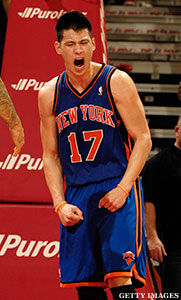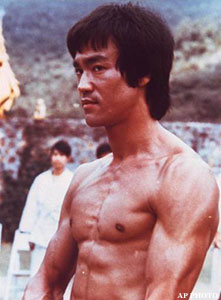 About 10 years ago, RadioShack ran a series of commercials that featured celebrity pairings of different ethnicities. Howie Long and Teri Hatcher were the Caucasians, Ving Rhames and Vanessa Williams were the African Americans, Alex Rodriguez and Daisy Fuentes were the Latinos. There was no Asian edition, and for good reason. While Lucy Liu, who was starring in "Ally McBeal" at the time, or skating champ Michelle Kwan would have been no-brainers to cast in the female role, who exactly was available to be the male star? RadioShack could have gone for an overseas action hero like Jackie Chan or Jet Li, but there were no viable Asian-American men in sports or pop culture that the general population would've been able to pick out of a police lineup. This is why the Jeremy Lin phenomenon has been so spectacular. While it does transcend race -- his story is the perfect storm of underdog elements being played out in the media capital of the world -- it does not exclude race. Lin is a breakthrough because the Asian American male has always lagged behind in cultural visibility and acceptance. There has been progress in other areas, particularly entertainment, but sports has been the final frontier. "If you look at it historically, the dominant group has always favored the female of a minority, seeing them as assets, commodities or possessions," says Ruth Chung, a USC professor who specializes in Asian American cultural identity. "Males are seen as competition, and for Asian American men, their greatest threat to white males was perceived to be their intelligence, so it was always easy to stereotype them as being geeky and socially inept."
About 10 years ago, RadioShack ran a series of commercials that featured celebrity pairings of different ethnicities. Howie Long and Teri Hatcher were the Caucasians, Ving Rhames and Vanessa Williams were the African Americans, Alex Rodriguez and Daisy Fuentes were the Latinos. There was no Asian edition, and for good reason. While Lucy Liu, who was starring in "Ally McBeal" at the time, or skating champ Michelle Kwan would have been no-brainers to cast in the female role, who exactly was available to be the male star? RadioShack could have gone for an overseas action hero like Jackie Chan or Jet Li, but there were no viable Asian-American men in sports or pop culture that the general population would've been able to pick out of a police lineup. This is why the Jeremy Lin phenomenon has been so spectacular. While it does transcend race -- his story is the perfect storm of underdog elements being played out in the media capital of the world -- it does not exclude race. Lin is a breakthrough because the Asian American male has always lagged behind in cultural visibility and acceptance. There has been progress in other areas, particularly entertainment, but sports has been the final frontier. "If you look at it historically, the dominant group has always favored the female of a minority, seeing them as assets, commodities or possessions," says Ruth Chung, a USC professor who specializes in Asian American cultural identity. "Males are seen as competition, and for Asian American men, their greatest threat to white males was perceived to be their intelligence, so it was always easy to stereotype them as being geeky and socially inept."
Most Asian male athletes of significance are either from Asia -- Yao Ming, Ichiro, Hideki Matsui, Manny Pacquiao -- or those not primarily identified as being Asian -- Tiger Woods, Hines Ward, Apolo Ohno, Johnny Damon.  Guys like Lin? Michael Chang and Dat Nguyen were inspiring pioneers. Chang was the youngest player to win a Grand Slam tournament when he captured the French Open as a 17-year-old and did get some commercial opportunities. Nguyen was an All-American linebacker at Texas A&M and led the Dallas Cowboys in tackles three times. But neither became a massive crossover star, nor have they been active in the past half decade -- a void that feeds into the Linsanity of the past two weeks. But accentuating the ethnic angle with Lin is tricky. Once the games start, none of that should matter. Sports is the ultimate equalizer, and race should be irrelevant. You can either play the game or you can't. You get the job done or you don't. Your family tree can't help you blow by defenders or sack the quarterback. Lin should not have been given any sort of affirmative action to address what had been the absence of Asian Americans in the NBA. But he should not have been short-changed the opportunity just because he doesn't look the part. That dynamic has been part of Lin's narrative, and sometimes it's not even overt racism at work. It is human nature to question something that hasn't been done before. "The greatest beauty in what Jeremy Lin is doing is that he fulfills an Asian American stereotype -- he is smart, he went to Harvard, he works hard -- and by doing so, he subverts another stereotype," Chung says. "If Asian men are going to be seen as intelligent, they have to be dismissed in other ways: Socially and sexually inept, not being masculine, and sports is often so wrapped up in a hyper-masculine identity."
Guys like Lin? Michael Chang and Dat Nguyen were inspiring pioneers. Chang was the youngest player to win a Grand Slam tournament when he captured the French Open as a 17-year-old and did get some commercial opportunities. Nguyen was an All-American linebacker at Texas A&M and led the Dallas Cowboys in tackles three times. But neither became a massive crossover star, nor have they been active in the past half decade -- a void that feeds into the Linsanity of the past two weeks. But accentuating the ethnic angle with Lin is tricky. Once the games start, none of that should matter. Sports is the ultimate equalizer, and race should be irrelevant. You can either play the game or you can't. You get the job done or you don't. Your family tree can't help you blow by defenders or sack the quarterback. Lin should not have been given any sort of affirmative action to address what had been the absence of Asian Americans in the NBA. But he should not have been short-changed the opportunity just because he doesn't look the part. That dynamic has been part of Lin's narrative, and sometimes it's not even overt racism at work. It is human nature to question something that hasn't been done before. "The greatest beauty in what Jeremy Lin is doing is that he fulfills an Asian American stereotype -- he is smart, he went to Harvard, he works hard -- and by doing so, he subverts another stereotype," Chung says. "If Asian men are going to be seen as intelligent, they have to be dismissed in other ways: Socially and sexually inept, not being masculine, and sports is often so wrapped up in a hyper-masculine identity."  About 20 years ago, I was playing basketball at a park. Four on four, me and seven African Americans. At the start of the game, I twice cut to the basket and received a pass for uncontested layups. After the second basket, one of the guys on the other team yelled at his teammates in exasperation: "Who the &$#@ is covering Bruce?!" I wasn't offended. He wasn't talking to me, and being compared to Bruce Lee is actually a compliment, despite the martial arts stereotype, because he exuded strength, confidence and sex appeal. I couldn't really fault the guy. At that time, Bruce Lee was probably his only frame of reference for an Asian male, even though Lee himself had been dead for nearly 20 years. Frankly it would've been a lot worse if he had decided to refer to me as The Donger of "Sixteen Candles" fame/infamy, and let's face it, that has happened to me and every other Asian American male of my generation. It was a huge step forward when an Asian guy got to play the leading man alongside a sexy co-star as Chow-Yun Fat did with Mira Sorvino in "The Replacement Killers" (1998) and Jet Li did with Aaliyah in "Romeo Must Die" (2000). In both cases, though, neither got to kiss the girl, which gets into the whole issue of negative or non-existent portrayals of Asian male sexuality. (Supposedly there is a kiss scene between Chow and Sorvino, but it was cut and is available only as a DVD alternate ending.)
About 20 years ago, I was playing basketball at a park. Four on four, me and seven African Americans. At the start of the game, I twice cut to the basket and received a pass for uncontested layups. After the second basket, one of the guys on the other team yelled at his teammates in exasperation: "Who the &$#@ is covering Bruce?!" I wasn't offended. He wasn't talking to me, and being compared to Bruce Lee is actually a compliment, despite the martial arts stereotype, because he exuded strength, confidence and sex appeal. I couldn't really fault the guy. At that time, Bruce Lee was probably his only frame of reference for an Asian male, even though Lee himself had been dead for nearly 20 years. Frankly it would've been a lot worse if he had decided to refer to me as The Donger of "Sixteen Candles" fame/infamy, and let's face it, that has happened to me and every other Asian American male of my generation. It was a huge step forward when an Asian guy got to play the leading man alongside a sexy co-star as Chow-Yun Fat did with Mira Sorvino in "The Replacement Killers" (1998) and Jet Li did with Aaliyah in "Romeo Must Die" (2000). In both cases, though, neither got to kiss the girl, which gets into the whole issue of negative or non-existent portrayals of Asian male sexuality. (Supposedly there is a kiss scene between Chow and Sorvino, but it was cut and is available only as a DVD alternate ending.)  But Hollywood is making progress. It no longer needs to lean on the overseas stars like Chow or Li to fill leading roles. "Lost" featured two Asian males. "The Mentalist" has one. Harold and Kumar both get the girl at the end of "Escape Guantanamo Bay." So perhaps the biggest sign of progress is that if RadioShack were looking to cast those commercials again today with an Asian version, Lin -- despite splattering scoresheets and shattering stereotypes -- would have competition to nail down the male spot. John Cho (Harold) has been picked twice for People magazine's "Sexiest Men Alive" list. Then again, Lin is playing with incredible confidence, and as Jack Palance once told us: "Confidence is very sexy."
But Hollywood is making progress. It no longer needs to lean on the overseas stars like Chow or Li to fill leading roles. "Lost" featured two Asian males. "The Mentalist" has one. Harold and Kumar both get the girl at the end of "Escape Guantanamo Bay." So perhaps the biggest sign of progress is that if RadioShack were looking to cast those commercials again today with an Asian version, Lin -- despite splattering scoresheets and shattering stereotypes -- would have competition to nail down the male spot. John Cho (Harold) has been picked twice for People magazine's "Sexiest Men Alive" list. Then again, Lin is playing with incredible confidence, and as Jack Palance once told us: "Confidence is very sexy."

Popular Stories On ThePostGame: -- Floyd Mayweather Hits Jeremy Lin On Race -- Jeremy Lin: Tweets By Chris Paul, Justin Tuck, Reggie Miller And More After Knicks' Latest Win -- Jeremy Lin's Middle School Yearbooks Hit eBay -- Jeremy Lin A Superstar? This Man Saw It Coming








